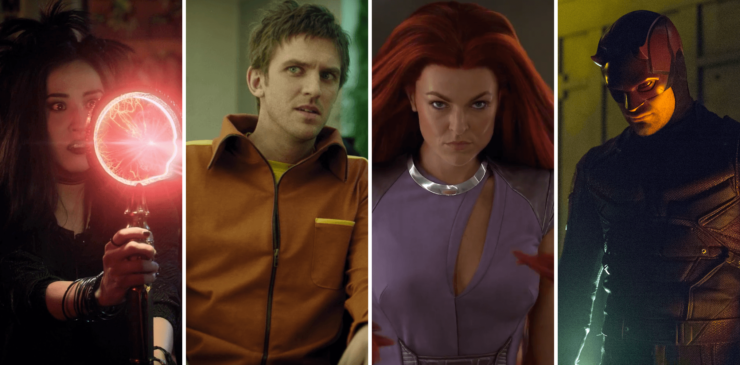Over the last decade, a wide variety of live-action Marvel superhero shows have been released… and I’ve watched every single one of them (well, all except for Powers—a PlayStation network show. If you’ve ever actually seen it, please let me know where it should go on this list). In honor of Helstrom’s recent premiere and the upcoming WandaVision series, I wanted to look back on the fourteen shows I’ve seen and let you know which ones were most (and least) deserving of your time.
My personal rankings below aren’t simply based on which series garnered the most critical acclaim or views. For each series, I looked at how interesting the story is, how entertaining the characters are, and how satisfied you’ll be when you get to the finish line (especially since most of these shows were eventually canceled). Now that disclaimer is out of the way, let’s start off by digging into the most painful live-action Marvel show of the last decade, according to me:
(Mild spoilers for some series below.)
14. Inhumans
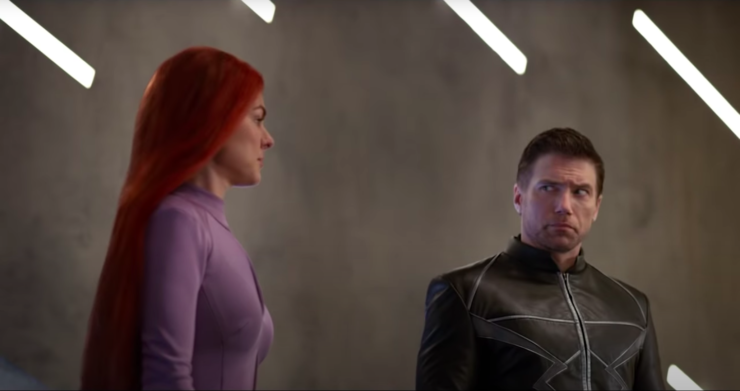
Premise: A bunch of superpowered people called Inhumans live in peace on the moon until a member of the royal family says “Hey, what if I attempted a coup today?”
Best Hero: Lockjaw, the teleporting bulldog.
Best Villain: The showrunner/writers.
Recap/Review: A royal named Maximus (played, suitably enough, by Ramsey Bolton Iwan Rheon) decides to seize power from his brother and king of the Inhumans, Black Bolt. The power grab forces the king and members of the royal family to flee to Earth. Although we’re clearly supposed to feel bad for the royals, the series makes it really, really hard. Black Bolt and his family maintain a strict caste system where people with bad powers are literally forced to work in mines for their entire lives. On top of that, every single high-ranking Inhuman is either entitled, without personality, or just really annoying.
Even Rheon’s Maximus is hard to root for because of how much he struggles to keep his motivations (or a consistent accent) straight. And if you’re thinking, “At least this is a show where we get to see people use superpowers!”, I’m sorry to inform you that the characters barely ever use their abilities in the course of the series. When these issues are combined with absurdly terrible dialogue, an extremely predictable storyline, and a complete waste of its Hawaiian setting, you get a show that is an absolute pain to sit through every week. I would rather watch Lockjaw the teleporting Bulldog sleep for 8 hours than revisit any episode of Marvel’s Inhumans.
Why It’s The Least Worthy: This show has no redeeming qualities.
13. Iron Fist
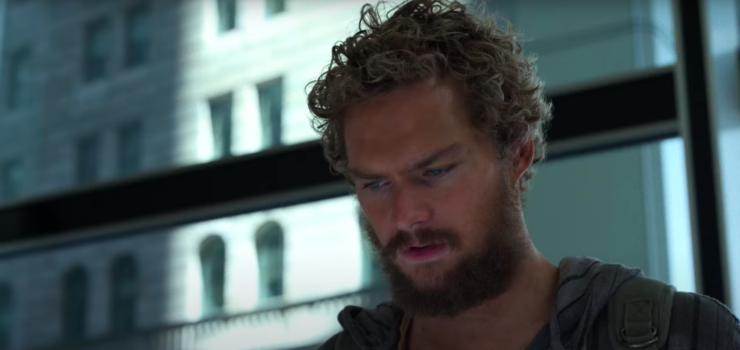
Premise: A rich guy with a glowing fist goes around punching people in New York.
Best Hero: Colleen Wing, the most competent person for miles.
Best Villain: “Typhoid Mary” Walker, a really complex and intriguing villain.
Recap/Review: Danny Rand’s backstory initially reminds you a bit—well, a lot—of Batman’s. After losing his parents, he gets intense martial arts training before returning to his hometown to stop an evil organization known as The Hand. But although the setup sounds cool, there’s one huge problem: Danny Rand. He is so focused on his single-minded goal of using his martial arts skills to take down The Hand that there is no room for his character to develop any likable traits. It doesn’t help that whenever Danny faces a setback, he immediately whines about it before remembering that he has billions of dollars that could improve the situation.
I might have been able to look past the protagonist’s personality flaws if his fighting prowess resulted in a ton of good fights. But while there were a few creative scraps here and there, the majority of the action on the series was just not that exciting. And despite training to be one of the best martial artists in the world, Danny still somehow manages to lose hand-to-hand fights. So, on top of being annoying, he’s not even good at the thing that he constantly talks about. What hurts most is that there are genuinely good characters waiting in the wings that are more deserving of the spotlight: Rand’s ally Colleen Wing and the villain “Typhoid Mary” really deserved more screen time than they got. Instead, we had to watch Danny whining about The Hand for two seasons before reaching an (admittedly cool, but baffling) cliffhanger ending.
Why It’s Worthier Than the Last: Iron Fist has two great characters to keep viewers interested, and actually makes use of the main character’s powers.
12. Helstrom
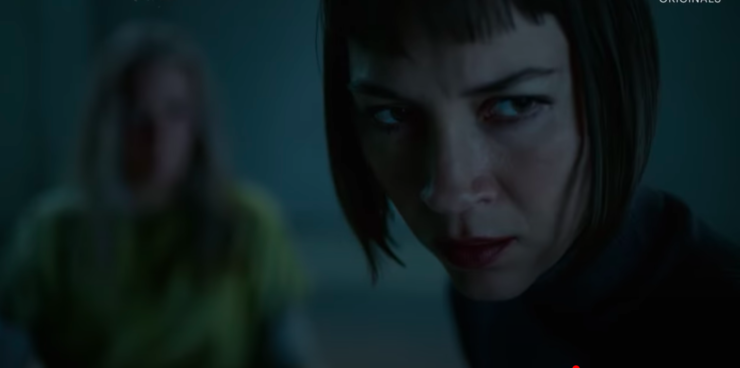
Premise: A brother and sister use their vaguely defined powers to stop demons from terrorizing a version of the Earth where the concept of bright colors doesn’t exist.
Best Hero: Ana Helstrom’s sarcasm.
Best Villain: A Surprisingly Intimidating Demon Named Mother.
Recap/Review: Marvel tried to embrace their spooky side with Helstrom. Unfortunately, this trip through the occult is extremely hard to follow. The show dumps us into a complicated supernatural setup without explaining all the details. Even as more and more mysteries are piled on top of the plot, you’re still struggling to understand the rules of the universe and how the powers work. For example, although Daimon can use telekinesis and has literal firepower, it seems that he is as vulnerable to injury as any normal human. But later on in the series, he’s shot by a gun and it does absolutely nothing to him. Was he bulletproof the whole time? Was this a one-off situation? Will the writers tell you? (I can answer that question: No, they won’t.)
The show’s saving grace is the Helstrom family. Although they’re supposed to be unlikable, I found myself really drawn to them. Ana in particular has a really tragic backstory that explains her cold demeanor. Though I wish they would have explored her queer identity a bit more, the writers did a great job at fleshing out her character motivations and personality quirks. If she and her brother were put into a simpler story that didn’t rely so heavily on jumpscares and creepy CGI, and where the rules of the universe weren’t constantly changing, you’d have a decent show. But as it is, trying to decode the world of Helstrom is a lot of hard work to go through for a cliffhanger ending that’s just okay.
Why It’s Worthier Than the Last: The main characters are a thousand times better than Danny Rand.
11. Agent Carter
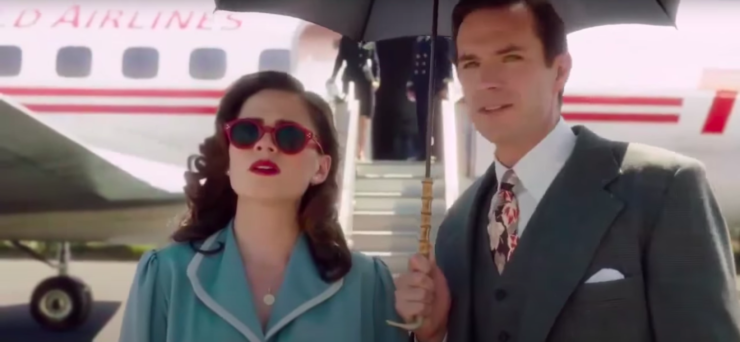
Premise: Agent Carter has to remind her fellow agents why she’s the G.O.A.T. every day while solving various mysteries for the SSR, the precursor to S.H.I.E.L.D.
Best Hero: Hayley Atwell, who clearly was destined to play Peggy Carter.
Best Villain: An evil version of Black Widow named Dottie Underwood.
Recap/Review: Hayley Atwell reprises the role she nailed in Captain America in the spin-off series. Although Peggy Carter was fairly respected in the movie, on the show (set in the 1940s), she has to deal with her coworkers’ rampant sexism in order to save the day. Peggy’s accompanied in her investigations by the charming Daniel Sousa, a war vet with a leg injury and a good heart. And we can’t forget about her sidekick Jarvis, Howard Stark’s funny, loyal, non-robot butler. These three characters (and the actors playing them) were so great that they all eventually appeared in different Marvel media after the show got canceled. But despite the great leads, Agent Carter couldn’t overcome its greatest problem: its slow pace.
Although it might be a little bit better now that you can stream it, watching the mysteries of the show sloooowly unfold and develop at a snail’s pace week to week was annoying. It also doesn’t help that we know that Peggy will survive whatever danger she gets in because she appears in three separate Marvel films that are set years after the series ends. By the same token, any time the world is threatened by a looming catastrophe, we know it will be fine because Agent Carter begins in the 1940s and the Earth is still intact in the modern-day MCU. Both the low stakes and slow pace make it difficult to really get invested in the show’s running storyline. If it wasn’t for the extremely colorful and charming characters, Agent Carter might have completely failed to keep me watching all the way through to the intriguing mystery they present in the final episode.
Why It’s Worthier Than the Last: Although the show moves slowly, at least you can understand what’s happening.
10. The Gifted
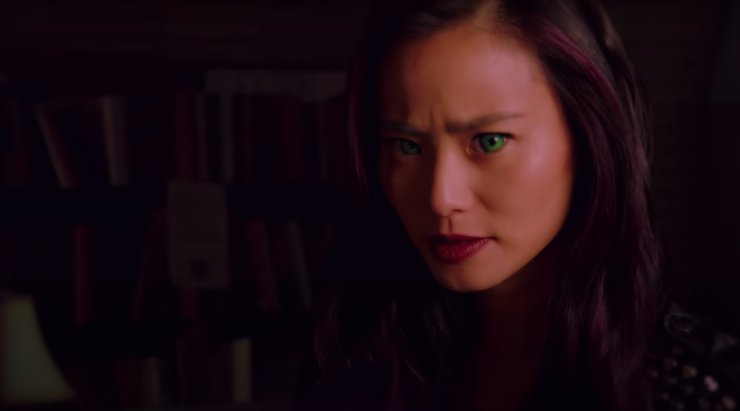
Premise: After a conflict between mutant protestors and their adversaries gets a bunch of innocent people killed, the X-Men and the Brotherhood peace out and leave the rest of the world’s mutants to be hunted and persecuted.
Best Hero: Eclipse, a former Cartel enforcer turned mutant resistance leader.
Best Villain: Jace Turner, a man whose desire for revenge slowly sends him spiraling into darkness.
Recap/Review: Almost every episode of The Gifted starts with a mini-story that explores a hero or villain’s past. These bite-size flashback scenes are often daring, heart-wrenching, and put the spotlight on characters that haven’t always gotten the chance to shine. Unfortunately, the show often pulls away from these interesting people to focus on the Struckers. At the beginning of the show, the Struckers are a normal family of four living in a turbulent world. But after the daughter and son discover they have mutant powers, the family is forced to hide underground with the rest of the mutant resistance.
Although their story can be interesting at points, there are many more compelling characters in the show: Eclipse has a fascinating backstory and moral code, the underrated Jamie Chung brings a lot of humanity to Blink, and Skyler Samuels gives a fun triple-threat performance as the three Frost sisters. But they’re repeatedly sidelined to check in on what the Strucker family has lost this week. Speaking of which, the heroes don’t win very often, which sometimes meant that you’d sit through three relentlessly depressing episodes before hope finally returned. Luckily, the show’s canny choice to use mutants to explore issues of immigration in the modern world kept me going through the dark spells. Maybe if The Gifted had shifted its focus to more interesting characters and brightened up a bit, the series wouldn’t have ended on yet another cool, but now sadly pointless, cliffhanger.
Why It’s Worthier Than the Last: A few of their best mini-stories had better pacing and higher stakes than some of Agent Carter’s storylines.
9. The Defenders
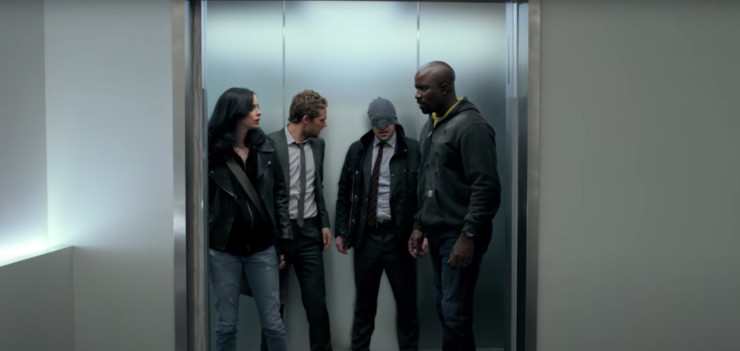
Premise: A group of NYC-based heroes that doesn’t include Spider-Man punch people until the city is safe again.
Best Hero: Daredevil shines ever so slightly above his allies.
Best Villain: Alexandra, because she’s played by Sigourney Weaver.
Recap/Review: I’ll be honest right from the get-go, here: the story of The Defenders is not particularly unique. The evil organization known as The Hand has a plan that could wreck the city, so four heroes have to team up to stop them. What the show lacks in originality, it makes up for in pure fun. I’ll just never get tired of seeing each of the Defenders use their unique abilities together in battle. For example, Iron Fist is able to punch Luke Cage’s tough skin with his glowing fist to create a shock wave that can knock enemies flat. And outside of their fight scenes, the four main Heroes have great chemistry. It’s particularly cool to see how Daredevil, who’s been consistently doing the hero thing the longest, interacts with his less-experienced colleagues.
On the evil side, it’s so much fun to see Sigourney Weaver whispering into the deadly Elektra’s ear. They really do make a great villainous team. But while the show does a fantastic job at the team aspect, it’s not so great at serving individual characters. Jessica Jones, in particular, doesn’t get much time to grow or develop her character at all. She’s mainly sidelined so that Daredevil and Danny Rand (of all people) can get more screen time. Although the choice to pull focus from her leads to a fantastic ending, that leads in turn straight into Daredevil’s third season, she still feels undervalued on the team. Luckily, audiences don’t have to dwell on how Jessica got shortchanged for very long, because there are only eight episodes.
Why It’s Worthier Than the Last: It’s a lot more fun and more optimistic than The Gifted.
8. Luke Cage
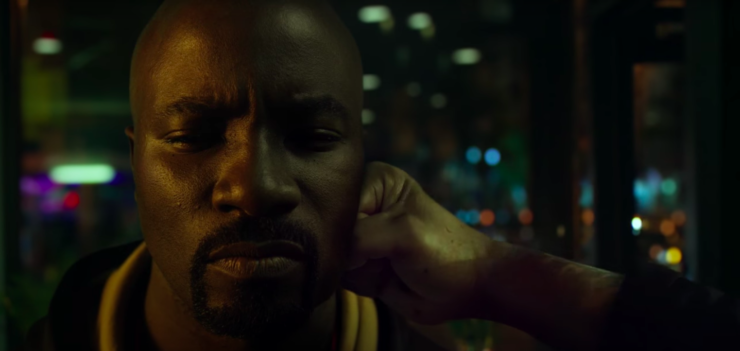
Premise: A black superhero named Luke Cage keeps the residents of Harlem safe from vicious criminals who constantly forget that Luke Cage is, you know, bulletproof.
Best Hero: Misty Knight, a police detective who deserves a much higher salary for all the nonsense she has to deal with.
Best Villain: Cornell “Cottonmouth” Stokes, who’s played to absolute perfection by Mahershala Ali.
Recap/Review: From the very beginning of the show, it was clear that Luke Cage was going to use its platform to explore issues affecting black people today. As the titular character and the determined Misty Knight tried to carve out a place in the world that already holds preconceived notions against them, intimidating villains like Cottonmouth tried to find a way to bring the hero down (that didn’t involve bullets). The tensions between the two sides steadily built in intensity until…a very big spoiler-ly thing happens, and their conflict comes to an abrupt end.
Luke Cage’s absolutely baffling choice to end the rivalry between the hero and main villain in the middle of season 1 killed the momentum that the show had been building. Although the show still manages to produce interesting and layered conflicts after this point, these just aren’t as compelling as the clash the season had initially been building toward. Fortunately, the series finds its footing again by the end of season 2, and the terrific ending to the show feels both shocking and inevitable at the same time. So if you can look past the controversial twist in season 1, you’ll get a deep, compelling show that explores the treatment of black people in American society through the eyes of a bulletproof man.
Why It’s Worthier Than the Last: Although the storyline isn’t perfect, at least Luke Cage tried to do something original.
7. Jessica Jones
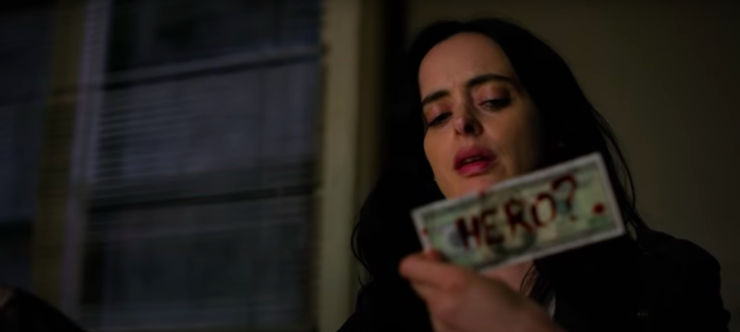
Premise: The series followed a super-powered P.I. who hides her struggles with past trauma behind alcoholism, sarcasm, and a killer leather jacket.
Best Hero: Krysten Ritter strikes the right balance between standoff-ish and sympathetic.
Best Villain: David Tennant’s Kilgrave is one of the most terrifying live-action Marvel Villians, period.
Recap/Review: The typical superhero show explores a person discovering that they have powers and deciding to use them to be a vigilante. But what if the titular hero had access to powers any kid would dream of, but didn’t want to use them? This is the position Jessica finds herself in after a mind-controlling supervillain name Kilgrave uses her body and superpowers to fulfill his warped desires. Despite her struggles with depression and alcoholism, she still tries to be a force of good in the world through her P.I. business. The show wraps this fascinating character study inside a complex and surprising mystery in season 1.
Unfortunately, season 2 is not nearly as strong. Jessica struggles to grow much as a character and the main mystery around the villain is so complicated that it could give Helstrom a run for its money. Season 3 gets the show back on track with another great storyline that keeps you guessing. Although the ensemble characters can get so annoying that they actively detract from the plot (looking at you, Jessica’s adopted sister Trish!), the show never loses sight of its central mysteries. When the last case in this series is closed, you’ll find yourself cheering at the hopeful ending that Jessica so rightly deserves.
Why It’s Worthier Than the Last: The intense conflict between the hero and the central villain is never cut short.
6. Cloak & Dagger
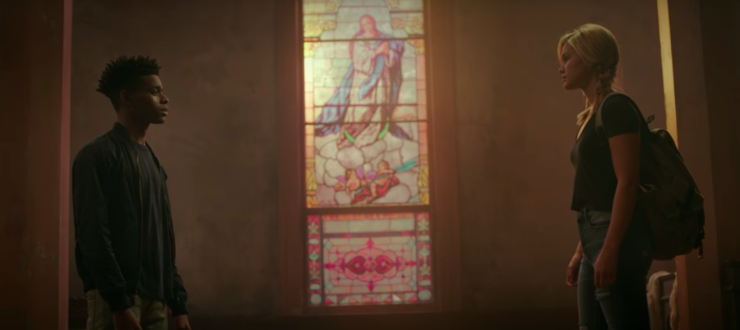
Premise: Two teenagers from very different walks of life have to save New Orleans with the power of light, darkness, and excellent cinematography.
Best Hero: Tyrone and Tandy, tie. Not just because that’s fun alliteration, but because they legitimately are given equal weight and character development.
Best Villain: Officer James Connor, a police officer with a dark secret that he desperately tries to cover up.
Recap/Review: Cloak & Dagger is another superhero show that feels refreshingly original. Tyrone and Tandy s primary powers allow them to tap into someone’s deepest fears and hopes, respectively. Every time we dive into someone’s head to see what they carry inside, we’re treated to stunning scenes that are packed to the brim with gorgeous visual metaphors and cinematography. Their secondary powers allow Tyrone and Tandy to teleport and create weapons made of light, respectively—which leads to some really fun action sequences. All of these abilities help them keep the city of New Orleans safe, even as the two dealt with extremely realistic and complicated issues and trauma.
While I do love how Tandy and Tyrone’s powers are portrayed, there are times where their abilities short out or greatly increase in power to better serve the plot. This can sometimes lead to story beats that feel cheap or like overly convenient deus ex machina. Speaking of cheap, the two big bads were, for lack of a better term, basic. Although the villains have intimidating demeanors and engage in dangerous plots that could ravage the city, their actual motivations are never quite complex or weighty enough to justify the destruction of New Orleans. Luckily, they often fade into the background of the show given the beautiful visuals, great chemistry between the leads, and extremely powerful examinations of subjects that real-world teenagers may actually be dealing with. By the time you reach the end of the show, you’ll want to (A) go to New Orleans immediately, and (B) see where the next step on the journey leads for this wonderful duo.
Why It’s Worthier Than the Last: The series never suffers a major drop in quality between seasons.
5. The Punisher
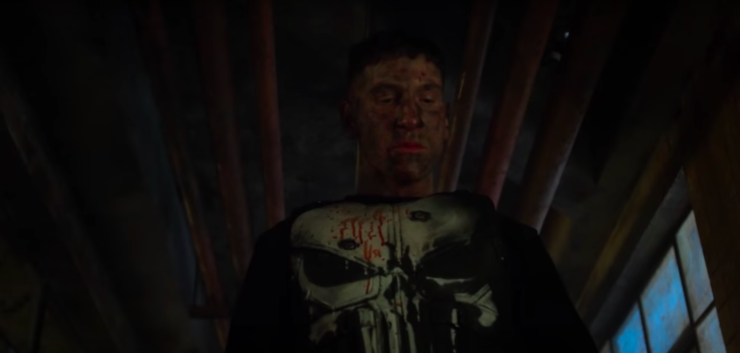
Premise: A veteran deals out extremely, extremely, extremely violent punishment to extraordinarily bad people who harm innocents.
Best Hero: Jon Bernthal’s masterclass performance as The Punisher.
Best Villain: I can’t say the character’s name without spoiling it, but trust me: this person is unhinged, devious, and every bit as formidable as The Punisher himself.
Recap/Review: The Punisher’s storyline is deceptively simple. A veteran decides to go after the people who killed his wife and children and find out why this heinous act was committed. But hidden underneath what could have been a stereotypical revenge plot is a profound examination of what it means to be a veteran returning home. The experience of being at war affects all of the characters differently enough to make each one of them feel nuanced, with an Emmy-worthy performance from Jon Bernthal leading the way. He is The Punisher, every time he comes on screen. And while he could have just been a grizzled badass with insane weapons skills (and don’t worry—he is), Bernthal also makes sure that we never lose sight of his humanity. He portrays Frank Castle as a deeply troubled man who is at war with himself, even while the enemies who have extremely personal connections to his past won’t let him find peace.
Since I can’t talk about the villains of the story without revealing major spoilers, I’ll mention the show’s two major drawbacks. If you can’t stomach a lot of violence, then I can’t exactly recommend that you watch The Punisher. While the level of gore in the series seems calculated to make viewers question their own reactions to violence and the emotional costs behind the spectacle, it can still be a lot to take in. And if you can look past the gore and get to season 2, you’re going to encounter a storyline that isn’t…bad, per se? It’s just that there are multiple characters’ plotlines all vying for your attention at once. And since the other people on the show aren’t quite as interesting as the Punisher, these supporting stories can sometimes feel like weird detours. Fortunately, Jon Bernthal is always there to elevate the series to new heights. His story built up to a solid conclusion that feels like the best place to leave one of the greatest portrayals of this character in live-action (for now).
Why It’s Worthier Than the Last: The villain’s motivations are stronger and more proportionate to their evil deeds. Also, the rules of this bloody universe are very consistent.
4. The Runaways
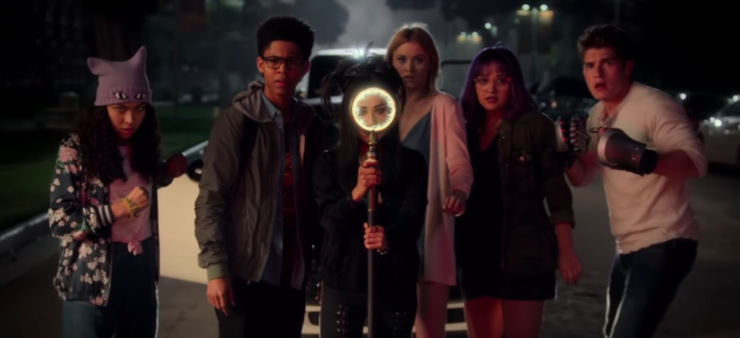
Premise: After a group of kids discovers that all of their parents are supervillains, they decide to become a heroic group that also just so happened to adopt a dinosaur.
Best Hero: Although all the kid characters are great, there’s simply no beating a dinosaur named Old Lace.
Best Villain: Julian McMahon blows his disappointing Doctor Doom performance in the Fantastic Four movies out of the water by portraying the terrifying Jonah.
Recap/Review: The Runaways gave itself a seemingly impossible task from the get-go. It has to tell the individual stories of six kids, their parents, and a host of important supporting characters without losing track of the plot or character motivations. Despite these incredible odds, the writers pull it off. Every single parent, child, and supporting character gets a chance to shine. Their distinct personalities and abilities come together to form one of the best and most diverse ensemble casts on a superhero series that I have ever had the pleasure to see. And the threats that the heroes face are tough enough to stick around for seasons at a time, but not so powerful that defeating them seems impossible. The realistic nature of these threats makes the conflicts that pop up feel natural…until they don’t.
Once an episode, a member of the ensemble will act just out-of-character enough to cause a new problem. And while I appreciate that the storyline never gets boring, it’s hard not to notice that one character has to hold the idiot ball every week in order for the plot to keep rolling. Fortunately, it’s incredibly easy to get into the story once you’ve started, and the hooks the writers leave at the end of each episode will encourage you to binge the series quickly. And since the writers had some advance notice that the show was being canceled, the ending wraps up all the series’ loose ends before it rides off into the sunset.
Why It’s Worthier Than the Last: The Punisher’s ensemble cast isn’t nearly as strong as The Runaways.
3. Legion
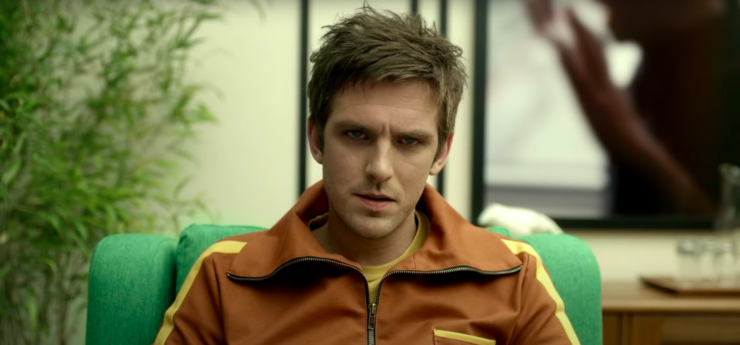
Premise: A telepathic mutant, diagnosed with schizophrenia at a young age, spends his life in and out of psychiatric institutions until he discovers he has enough power to really ruin everybody’s day.
Best Hero(es): Cary and Kerry Loudermilk, a pair of mutants tied together by an incredibly heartwarming and unique concept.
Best Villain: Amahl Farouk/the Shadow King, whose intimidating and unnerving performance earns him a spot in the Creepy Marvel Villain Hall of Fame alongside Kilgrave.
Recap/Review: Legion is gorgeous. You could honestly turn off the sound and get a sense of the story by the watching the performances and visuals alone…but I really wouldn’t recommend doing that because the story is very complex. Although most of the story is told from David’s point of view, his mental issues, virtually limitless powers, and abilities to create extensive realities both inside his mind and the real world make it hard to tell if what you’re seeing onscreen is actually happening. It’s imperative for viewers to lean in and focus—it’s not the kind of show you can just have on in the background. But if you invest your attention span fully in Legion’s strange, compelling world, you’ll be rewarded with a superhero experience unlike any other, anchored by a stellar cast.
Dan Stevens plays David with manic energy, quiet sympathy, and grounded realness all at the same time. Cary and Kerry Loudermilk (Bill Irwin and Amber Midthunder, respectively) have a dynamic and moving relationship that you can’t help becoming invested in. Audrey Plaza’s Lenny is extremely intense, unpredictable, and always fun to watch. And I haven’t even mentioned how fantastic Navid Negahban is as the Shadow King, or brought up that time Jemaine Clement’s Oliver gets into a rap battle with the Big Bad Wolf, played by Jason Mantzoukas. (Trust me, that one will make sense when you watch the show.) Legion’s rich characters, spectacular cinematography, and the revelation of a season 2 twist so shocking that it flips the entire show on its head are just a few of the reasons you should watch the series through to its nearly perfect conclusion…which you still might be a tiny bit confused about.
Why It’s Worthier Than the Last: Although you may not always understand the character motivations at first, at least they’re always consistent.
2. Agents of S.H.I.E.L.D.
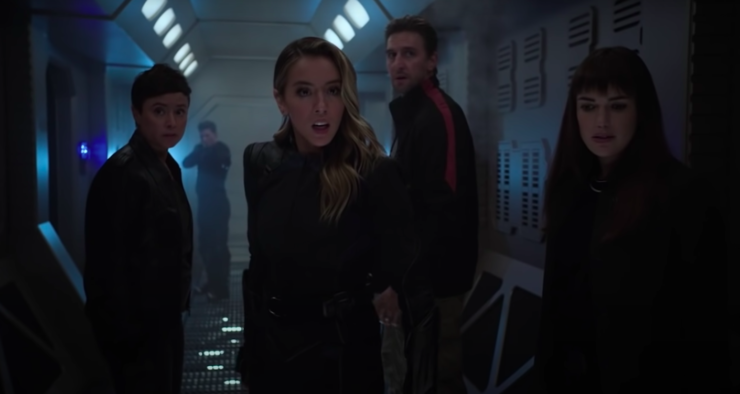
Premise: The Agents of S.H.I.E.L.D. go around the world to stop the threats that the Avengers apparently can’t be bothered to deal with.
Best Hero: I’m just gonna go ahead and call a six-way tie between May, Coulson, Daisy, Fitz, Gemma, and Mac because I refuse to choose just one.
Best Villain: It’s another spoiler, but trust me, this villain’s adaptability and ability to keep coming back make them a really fun antagonist.
Recap/Review: I’m going to address the Helicarrier-sized elephant in the room right away: The first season of the show is not that great. When the series began, the characters all fell into their usual archetypes. You had the hacker, the badass veteran field agent, and the tech geek, just to name a few. The series also tried to tie itself into the events of the Marvel Universe in ways that didn’t always work. There was literally an episode where the S.H.I.E.L.D agents had to pick up garbage left behind from Thor 2: The Dark World (one of the saddest sentences I have ever had to type), but after S.H.I.E.L.D fell in Captain America: Winter Soldier the show was finally cut loose and ready to fulfill its destiny… namely, to be really, really good.
The characters broke out of their archetypes. Starting with season 2 on, the hacker became a powerful field agent, the veteran badass started exploring the deep trauma that made them that way, and a tech geek became one of the most lethal members of the team. As they developed individually, the ensemble got so close that it felt like you were watching a real family fight evil together. And the threats they faced were complicated, fleshed-out, and always interesting. You never knew what to expect when each episode left you on a new, exciting cliffhanger. I can’t put into words how satisfying it was to see a show that was originally marketed as a Marvel tie-in become a strong series whose stories rivaled the best movies within the MCU. The only way for you to truly know how it feels is to watch Agents of S.H.I.E.L.D from the first mission all the way up to its heartwarming and tremendous conclusion.
Why It’s Worthier Than the Last: It’s got a great ensemble cast and surprising storylines like Legion, while being much easier to understand.
1. Daredevil
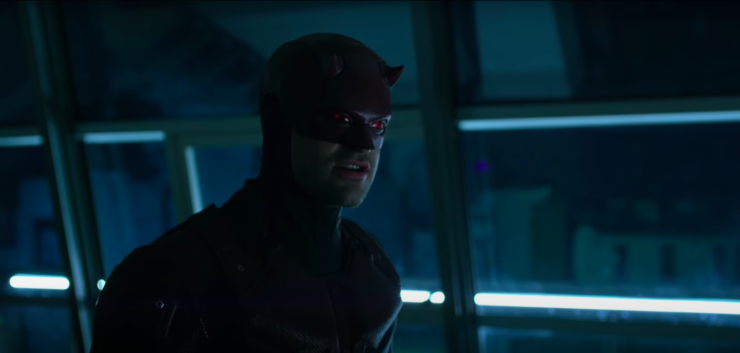
Premise: A blind lawyer uses his incredible fighting skills to keep New York City (well, really just Hell’s Kitchen, mostly) in check outside of the courtroom.
Best Hero: Charlie Cox as the devil of Hell’s Kitchen is just…*chef’s kiss*
Best Villain: Vincent D’Onofrio as Kingpin is just…*insert the sound of 9 bowling strikes happening all at once*
Recap/Review: Daredevil is what happens when every single aspect of a superhero show blends together perfectly. The casting is perfect. Charlie Cox plays the blind lawyer Daredevil as a deeply conflicted man who is willing to either go by the book, or to literally throw it at villains, along with his fists, in order to get justice. Vincent D’Onofrio plays the Kingpin as a deeply disturbed and uncompromising man who genuinely believes that he is doing the best he can for the city. Their performances are both so good and so nuanced that they’re worthy of being called the definitive live-action versions of their characters, the standard by which all other actors attempting these roles should measure themselves against in the future.
The conflict between these two central characters unfolds over a tight and compelling three-season run. Even when they’re not going head-to-head directly, the story has enough substance and emotional weight to keep audiences fully invested. And if the plot wasn’t enough to keep people in their seats, the fight scenes would definitely do it. If you only listen to one thing that I say in this article, please hear me when I say that you need to go re-watch the hallway fight scene in the second episode if you have already seen it before. The way this breathtaking fight also manages to convey an entire short story—one that you could understand even if you never saw a minute of the show before—is frankly incredible. Is the show completely flawless? No. The legal jargon can get a little dense and there’s a bit of an awkward transition between plotlines in season 2. But those minor flaws aren’t nearly enough to bring this series down from its number one spot. Unlike Agents of S.H.I.E.L.D., the show starts strong from the beginning and never lets up until its perfect ending (an ending that admittedly came far too soon).
Daredevil’s consistently high quality, fascinating characters, and thrilling action make it the must-watch superhero show for any fan of the genre.
Andrew Tejada is an NYC native so there’s a 90 percent chance this was written on the subway. When he’s not writing or consuming movies/tv, he’s pitching his Static Shock screenplay to anyone who’ll listen. More of Andrew’s projects and words can be found on Facebook at “Arete Writes Things.”










